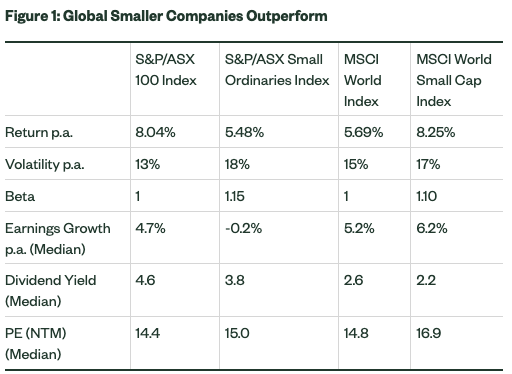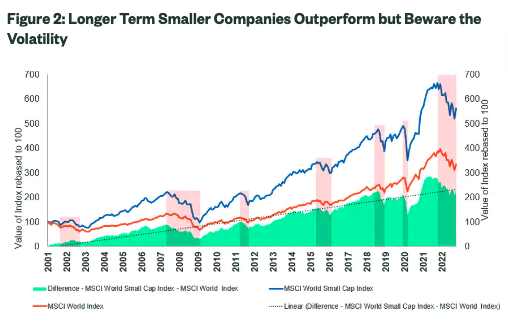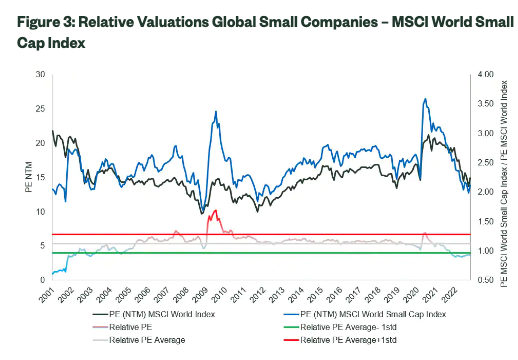The allure of smaller companies
Many investors are interested in investing in smaller companies – especially ones that might eventually become bigger companies. Many smaller companies are in the early stage of their corporate life cycle and can often offer potential for above market growth. Additionally they are often less appreciated by investors in their early years and offer potential for a valuation uplift as investors appreciate the business. But with the allure of outsized returns also comes greater uncertainty and risk.

In the last 20 years the best place to be for smaller companies has been global not local. The MSCI World Small Cap Index has generated 8.25% p.a. and has outperformed the MSCI World Index by 2.56% p.a. as well as Australian smaller companies by +2.76%.1 The index has been associated with earnings growth of 6.2% an average yield of 2.2% and an average multiple of 16.9 since Jan 2001.1 Smaller companies are known to be more volatile than larger capitalised stocks and this can be seen in both the annualized volatility and the beta of the smaller capitalized companies.
As shown in figure 2 below the MSCI World small capitalised stocks outperform the most during bull markets and underperform the most during market corrections. The cycles of both outperformance and under performance are usually a function of changing investor risk appetites as well as liquidity effects.

Source: Factset, SSGA from 30 January 2001 to 31 October 2022.Past performance is not a reliable indicator of future performance. Index returns reflect capital gains and losses, income, and the reinvestment of dividends. Index returns are unmanaged and do not reflect the deduction of any fees or expenses.
The excess return over the last 20 years is significant but depending on your entry the investor experience can be varied. In figure 2 the red shaded areas show the periods of underperformance associated with equity market down turns also associated with tighter liquidity conditions and risk averse investor behaviour. Investor risk appetite and liquidity also impact the valuation multiples that investors are willing to ascribe to these companies.
Figure 3 shows the changes in PE (NTM) for the last 20 years and you can observe the changing valuation multiples investors are willing to ascribe during bullish and bearish market environments. The underperformance during these periods usually take the smaller companies from above market valuations to more attractive longer term valuations. Figure 3 below places current valuations in historical context.

Source: Factset, SSGA from 30 January 2001 to 31 October 2022.Past performance is not a reliable indicator of future performance. Index returns reflect capital gains and losses, income, and the reinvestment of dividends. Index returns are unmanaged and do not reflect the deduction of any fees or expenses.
The Bottom Line
After the recent correction in the global equities, smaller capitalised stocks are now trading at lower valuations relative to history in an absolute sense and relative to the MSCI World Index. When liquidity conditions improve and investors become less risk averse the cyclical environment should be more favourable for smaller companies.
1 topic

Bruce is Head of Active Quantitative Equity - Australia, for State Street Global Advisors. He has over 20 years' experience, covering Australian and global equites, long and short equities as well as global macro strategies.

Bruce is Head of Active Quantitative Equity - Australia, for State Street Global Advisors. He has over 20 years' experience, covering Australian and global equites, long and short equities as well as global macro strategies.
